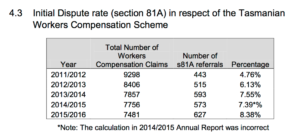
When a claim for workers compensation is disputed the first step is that the insurer/employer seeks a determination by the Workers Rehabilitation & Compensation Tribunal of a ‘reasonably arguable case’. There is a relatively low threshold for the Tribunal to make such a finding i.e. establish that there is some reasonable doubt about liability. This finding is not a final determination about whether a claimant has a valid claim.
In their 2015-16 Annual Report the Workers Rehabilitation & Compensation Tribunal provides the following information.
The number of ‘disputes’ dipped slightly in 2014/15, but overall continues to rise – up to 8.38% of claims in 2015/16 year compared to 4.76% in 2011/12 (and even lower in previous years).
The Tribunal received 627 section 81A referrals in 2015/16. Over 90% of referrals resulted in a Reasonably Arguable Case finding (or consent to that finding). 75 (12%) of those 627 went on to file s42 referrals and to commence the conciliation process in respect of their disputed claim.
This statistic means that the vast majority (nearly 90%) of claimants do not attempt to come back to pursue their claim after a reasonably arguable case finding (or consent to that finding). The number of disputes continues to rise, while the overall number of claims continues to fall.
In the previous year about 40% of section 81A disputes related to psychological injury claims ad this rate has reduced to about 35%, meaning that disputes relating to physical injuries have increased further. The statistics do not provide any information that help to understand the reasons for the continuing increase in disputes, especially claims for physical injuries.
Here is a link to the full report.
http://www.workerscomp.tas.gov.au/__data/assets/pdf_file/0004/361525/2016_WRCT_Annual_Report.pdf









